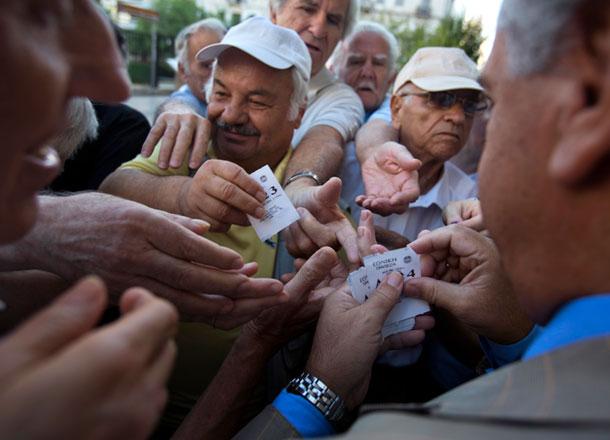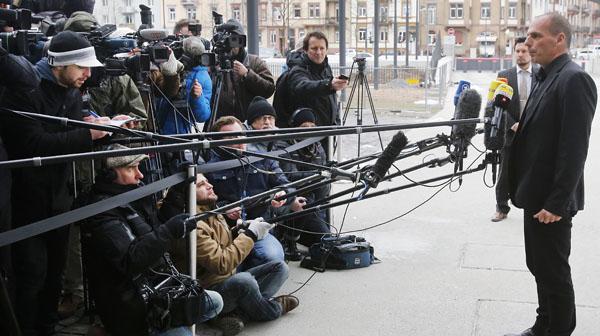You are here
Tensions with Germany over 'greedy' Greece's debt
By AFP - Feb 26,2015 - Last updated at Feb 26,2015
Athens – Fresh tensions emerged Thursday between Greece and Germany as attention turned to Athens's huge debt pile two days after the stricken eurozone country secured an extension of its bailout.
Greece, whose economy has shrunk by a quarter in six years, owes 320 billion euros ($365 billion), equal to 175 per cent of its annual economic output.
Prime Minister Alexis Tsipras, who swept to power last month on a wave of anger at years of austerity cuts, wants to use a four-month bailout extension secured on Tuesday to renegotiate this debt mountain.
Finance Minister Yanis Varoufakis, the frank-talking economics professor hired by Tsipras to reach a better deal with Greece's creditors, called Wednesday to "begin immediately" a discussion on this.
But with Greece having already secured a 100-billion-euro write-down of its debt to private creditors and two bailouts of 240 billion euros, German Finance Minister Wolfgang Schaeuble expressed Thursday his "disbelief" at any such suggestion.
"I can't see anything in what Varoufakis is doing that makes life easier for us," the veteran German minister was quoted as telling a parliamentary group meeting.
"No more billions for the greedy Greeks!" screamed mass daily Bild Thursday under a huge "Nein!" ("No!") headline.
Green shoots
The extension to Greece's lifeline still needs approval from the German parliament and possibly Greece's, but this should be a formality despite unease among some lawmakers in both countries.
To secure the lifeline, Tsipras's new hard-left government published a six-page list of proposed reforms focused on boosting tax receipts and cutting spending through improved efficiencies.
But Tsipras, 40, had to temper campaign promises to hike the minimum wage, reinstate laid-off civil servants and alleviate poverty by vowing that this would be done only in consultation with Greece's creditors.
Varoufakis, meanwhile, told Bloomberg TV in an interview that 700 million euros was deposited at Greek banks on Tuesday.
That is a fraction of the 20 billion euros withdrawn in panic when elections were called and Greece lurched into a new crisis in December, but Varoufakis said this showed confidence was returning.
"There was a deposit flight back into the Greek banking sector," the fluent English-speaker told Bloomberg. "It's a question of direction. Once you turn the tide, you hope."
Doubts in Deutschland
But Greece, which has been in almost constant crisis mode since 2010 fighting to stay in the single currency zone, is by no means out of the woods.
German Chancellor Angela Merkel said Wednesday that the extension was just a "starting point" and that Berlin was under "no illusions" about the challenges ahead.
Schaeuble went further, saying that there was a "lot of doubt in Germany" about whether Athens will stick to the commitments.
"The question now is whether one can believe the assurances of the Greek government or not," Schaeuble said.
According to a survey published on Wednesday, only 21 per cent of Germans are in favour of extending the bailout.
The International Monetary Fund (IMF) and the European Central Bank, which together with the eurozone states hold most of Greece's debts, have also expressed misgivings.
Over the coming four months Greece needs to firm up its reform plans and show by the end of April that they are bearing fruit before receiving a final bailout disbursement of 7.2 billion euros.
In the meantime Greece has to repay several billion euros' worth of maturing debts, including some two billion euros to the IMF in March and April and 6.7 billion euros in ECB bonds maturing in July and August.
In 2015, Greece has to pay back around 19 billion euros.
"We are going to have problems repaying IMF debts and the ECB in July," Varoufakis told Alpha Radio, denying however that this would give the government liquidity problems.
In the Bloomberg interview, Varoufakis suggested that the ECB could settle Greece's debts with the IMF using around two billion euros in bond profits that he said was owed to Athens.
"This is money we are owed," he said. "I find it very hard to imagine that Europe and the IMF will allow us to trip over what is a relatively small cash problem."
Related Articles
FRANKFURT () — Eurozone ministers approved the launch of Greece bailout talks and the European Central Bank (ECB) boosted its cash lifeline
Greek Prime Minister Alexis Tsipras tore into his European Union (EU) allies on Thursday, pledging to "put an end once and for all" to the EU's austerity policies.
Greece's new leftist government appealed to the European Central Bank (ECB) on Wednesday to keep its banks afloat as it seeks to negotiate debt relief with its eurozone partners, but Germany rejected any rollback of agreed austerity policies.













